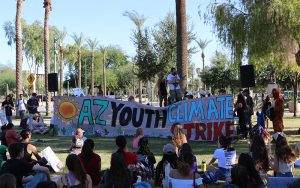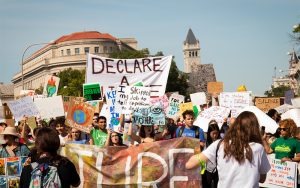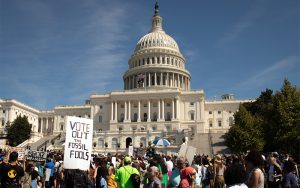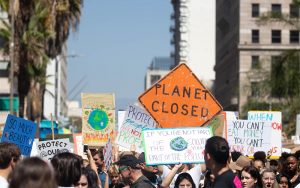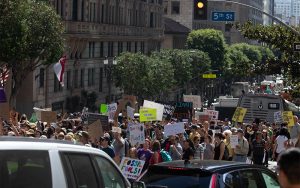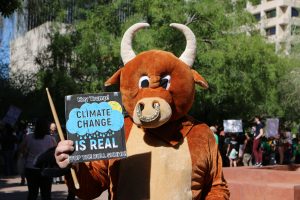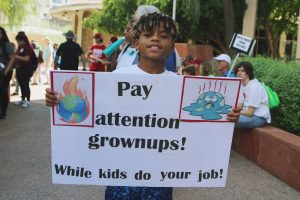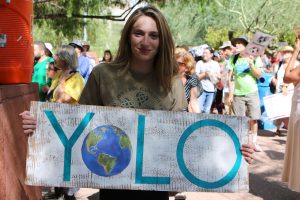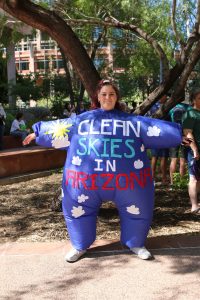- Slug: BC-CNS Climate Strike. 970 words.
- 12 photos and captions below.
- Video from Phoenix here and from D.C. here.
By James Carr and Wissam Melhem
Cronkite News
Young people around the globe took to the streets Friday to demand that global leaders act to mitigate climate change today to ensure there’ll be a tomorrow.
About 2,000 people marched in Phoenix, and similar events were scheduled in Tucson, Flagstaff, Yuma, Payson, Prescott, Show Low, Scottsdale, Mesa and Tempe. In cities from Los Angeles to Cape Town, South Africa, and Kiev, Ukraine, thousands turned out to address the rise of greenhouse-gas emissions and the subsequent warming of the planet.
The strikes, which came three days before world leaders gather in New York City for the U.N 2019 Climate Action Summit, were inspired by the activism of 16-year-old Greta Thunberg of Sweden, who began protesting alone outside the Swedish Parliament more than a year ago. Since then, she has traveled to the U.S. on a zero-emissions sailboat and testified in front of Congress, the U.N., the European Union and other world organizations.
Amritha Karthikeyan of Phoenix was in Washington on Friday and missed the climate strike she helped organize back home, but that was OK with her. The high school senior attended a companion rally with thousands of others in front of the U.S. Capitol.
“I wanted to come to the D.C. Climate Strike to show my support for climate issues and show that I’m dedicated to solve the issue even in the littlest way I can,” said Karthikeyan, who was in Washington for a conference anyway.
The 17-year-old, who attends BASIS Phoenix, was among a handful of Arizonans who joined thousands on Capitol Hill as part of the Global Climate Strike. On a hot, sunny day, they marched from John Marshall Park to the Capitol, where the list of speakers included Rep. Raul Grijalva, D-Tucson, and Tokata Iron Eyes, 15, an environmental activist from the Standing Rock Sioux Tribe, whose reservation is in North and South Dakota.
Grijalva echoed the message of rally organizers when he told the crowd there is a need to “protect all life, not just protect the profits,” before calling on his colleagues in Congress to take urgent action.
“Time is not on our side when it comes to the climate crisis and the need of systematic, strong and powerful and bold solutions,” he said. “As time passes, this climate crisis becomes worse and worse and worse.”
Marchers in Washington waved signs and banners demanding that the government tackle climate change, stop taking money from the fossil fuel industry and pass the comprehensive Green New Deal proposed by progressive Democrats in Congress.
Demonstrators expressed their anger and frustration as they marched with chants that included “Hey, hey, ho ho, climate change has got to go!” and “Vote Trump out!”
Scores of students skipped classes to attend the march. Layal Rabat, an adult volunteer for the Phoenix Restoration Project, said that makes sense because young people will be most affected by climate change.
“They are super-smart, super-capable of leading their own movements,” said Rabat, who accompanied Karthikeyan to the D.C. conference and march. “In a few years, if things keep going the way that they are going, nobody is going to be able to go to school at all.”
After marchers arrived at the Capitol, Iron Eyes – a leading figure in the youth environmental movement along with Thundberg – led the crowd in an indigenous prayer before speakers took the stage.
The rally’s message was loud and clear: Enough is enough, the climate needs immediate action.
“We are the generation that has to deal with the problems that these fossil fuel industries have created,” Karthikeyan said, “so we are the ones that have to fight for it the most, because we have to live with it.”
Friday’s youth climate march in Phoenix, which is meant to send a message to state officials, began at 2 p.m. at Maricopa County Courthouse and proceeded west to the state Capitol. On its Facebook page, Arizona Youth Climate Strike, one of the organizers, said activists are “calling for the protection and restoration of 50% of the world’s lands and oceans, including a halt to all deforestation, by 2030.”
The organization’s website lists further demands, such as Phoenix declaring a climate emergency and Arizona transitioning to “a 100% clean energy grid with nuclear … by 2035 and must transition off of nuclear by 2050.”
Aniket Pandey, youth climate ambassador, attended the strike with the hopes of not only bringing more awareness to the issue but to also educate those watching the strike.
“I feel you can’t make a solution without addressing the problem and identifying the actual problem,” Pandey said. “You can have a strike, you can have people show up, but if you have people talking about way complex stuff like, ‘You should do this and this, and buy this and plant trees,’ but (if) they don’t know why we’re doing this or they don’t know how we’re doing this, there is no point.
“I feel like the awareness and informing the audience is the most important part of this entire climate strike.”
Although it’s important to act against climate change, Pandey said getting real policy changes will require realistic goals.
“I personally don’t want to see way too ambitious goals because I believe you won’t have support of the people,” Pandey said. “If you go for a goal like, ‘In five years I want full renewable energy and no fossil fuels,’ that’s unrealistic and won’t get any support from any of the people; you will just get support from the extremes and you need support from the wide public in order to get policies done and enacted.”
Video by Cronkite News reporters Jordan Evans and Melanie Porter.
Cronkite News reporter Kailey Broussard contributed to this reporting.
For more stories from Cronkite News, visit cronkitenews.azpbs.org.
^_=
